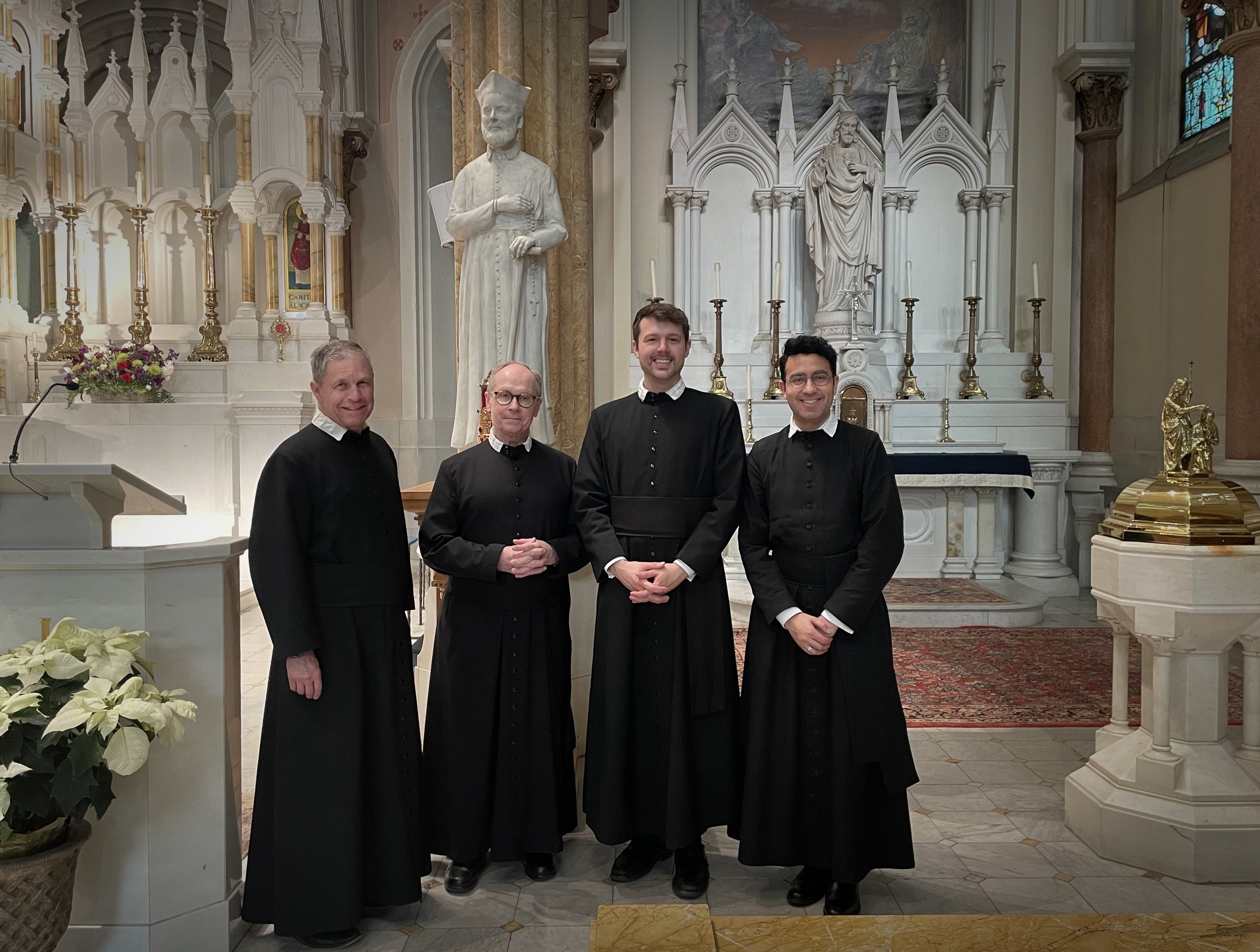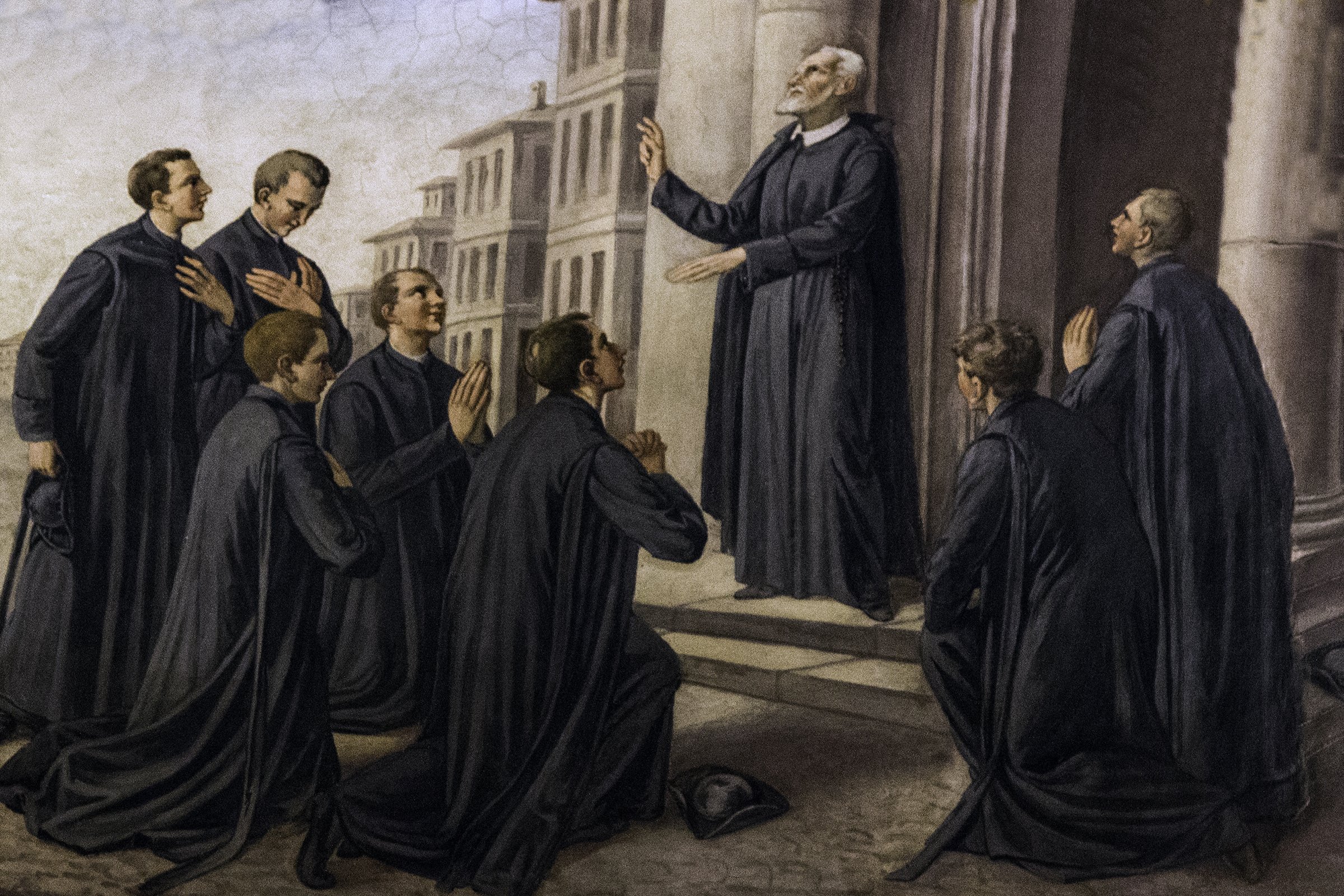
Oratory
FAQs
-
The Congregation of the Oratory of St. Philip Neri (C.O. or Cong.Orat), often referred to simply as the Oratory, is a society of apostolic life of Catholic priests and lay brothers founded by St. Philip Neri in A.D. 1575. It originated in the city of Rome, where St. Philip gathered a group of priests and laymen to foster spiritual life through prayer, familiar discourse on the Word of God, community life, and pastoral ministry. The name Oratory means "a place of prayer" and the congregation was called such because prayer in common formed the basic expression of the community's approach to God. The spirituality of the Oratory is characterized by joyful devotion, simplicity, and a deep personal relationship with God. St. Philip Neri emphasized the importance of prayer, particularly communal prayer and devotion, as well as a balance of spiritual life and everyday activities. Members of the Oratory live in community, sharing a common life of prayer, study, fellowship, and service. Oratorians are known for their pastoral work, especially in preaching, teaching, and the sacraments, and are typically involved in parish ministry, spiritual direction, education, and various forms of evangelization. We also share a deep devotion to our founder, St. Philip Neri, whose charism of joy and practical spirituality continues to inspire our way of life and ministry.
Unlike the religious orders, Oratorians do not take formal vows of poverty, chastity, and obedience, although we do commit to living in community and following the rule of the Oratory. Each Oratory is autonomous, meaning it operates independently under the leadership of its superior (known as the Provost or Father Superior), who is elected by the community. Similar to the monastic practice of stability (a monk commits his whole life to a particular monastery), the Oratorian ideal is to live out their entire lives in the house they have joined, but unlike monks we do not do so under the obligation of a vow, but simply by virtue of charity to our brethren. This is St. Philip's own design, and is what he called "a weaponless state"—one who joins must intend to remain forever, but he is free to leave at any time.
The Oratory grew beyond Rome during St. Philip's lifetime and has since spread internationally. It has influenced many other religious communities and individuals through its approach to spirituality and pastoral ministry; perhaps most notably, St. Francis de Sales, C.O. who himself founded and led an Oratory in Thonon, France before he became a bishop. Among our saints is also St. Joseph Vaz, C.O. the Apostle to Sri Lanka. The Oratory was brought to the Anglophone world by the famous English convert St. John Henry Newman, C.O.* in the 19th century, who became the first Provost of the Birmingham Oratory in England in 1848, and who helped found the London Oratory a year later, under the direction of Fr. Frederick William Faber, C.O. Today, the Oratory continues to thrive as a vibrant spiritual community within the Catholic Church, with various Oratories around the world following the model established by St. Philip.*Not to be confused with St. John Neumann, C.S.S.R. (1811-1860), the fourth archbishop of Philadelphia.
-
In A.D. 1990, the community-in-formation for the Oratory in Philadelphia was formed by Fr. Georges Thiers, C.O., and Fr. Paul Convery, C.O., and they were given the care of the historic St. Francis Xavier Church and School by the Archdiocese of Philadelphia. In A.D. 2000, the Philadelphia Oratory was given canonical status and established by Pope John Paul II as a Congregation of Pontifical Right.
In addition to the general care of the parish and the school, our other primary public ministries consist primarily of our Secular Oratory of young adults, our women's group, and organizing retreats and days of recollection for diocesan priests, as well as our annual Christmas and Lenten concerts.
Our in-house ministry is supporting each other to grow in holiness in a spirit of "charity and cheerfulness," as exemplified by our founder, St. Philip Neri. Daily Mass, lectio divina, meditation, and private prayer form the backbone of our life. We share a common daily meal at dinner, during which a passage of Scripture is read, followed by an episode from the vita of St. Philip Neri, and finally whatever the community has selected to be read throughout the rest of the meal. So as to grow in the "bonds of charity" we make ourselves ever-ready to help each other in the daily tasks that arise.Our private in-house ministry is supporting each other to grow in holiness in a spirit of "charity and cheerfulness," as exemplified by our founder, St. Philip Neri. Daily Mass, lectio divina, meditation, and private prayer form the backbone of our life. We share daily meals, during which an episode from the vita of St. Philip Neri is read aloud followed by readings from religious commentary. So as to grow in the "bonds of charity" we make ourselves ever ready to help each other in daily tasks that arise.
-
The process of discerning a vocation to our Oratory commences with visiting and spending time with our community. After a sufficient number of visits whereupon the aspirant and the members of the Oratory have gotten to know each other, the aspirant may request entry for the "guestship" or postulancy, which is a three month period of prayer while living and working with the community.
At the close of the "guestship", the postulant may request entry into "first probation" or novitiate. If accepted, he will receive the habit and the title "brother" if he is not already an ordained priest or deacon.
If the new brother aspires to the priesthood, he will commence seminary studies and in-house formation in Oratorian spirituality and tradition.
At the close of the first year, a continuance into a two-year "second probation" may be requested.
At the close of his third year at the Oratory, the member will be aggregated into the community and will thereby be permitted to affix Cong. Orat. or simply C.O. after his name in official correspondence. He will also be admitted to general congregation meetings where he will have a passive vote.
After the sixth year-- and generally coinciding with ordination-- he will receive full voting rights at general congregation meetings.
-
No, though most Oratorians are priests or in formation to the priesthood. Although the Oratorians are a society of apostolic life and not a religious order, there is a venerable tradition of Oratorians who choose to become permanent brothers or permanent deacons. In such a case, so as to include him in the daily mission of our Oratory, the permanent brother would be tasked with an essential responsibility or ministry which would be determined by mutual agreement and natural aptitude.
-
Priests from any diocese may join the Oratory, provided that they feel a strong connection to the charism and unique character of the community. A priest seeking to join the community must have the permission of his Ordinary.
May the intercession of St. Philip Neri, St. John Henry Cardinal Newman, and all the sainted Oratorians guide you in your discernment!


